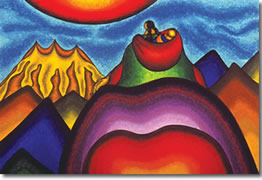
Venezuela: The Sacred and the Magic of the Bolivian Andes
The Andean Development Corporation (CAF) and the Bolivian Embassy in Venezuela today opened The Sacred and the Magic of the Bolivian Andes exhibition in the headquarters of the multilateral financial organization in Caracas. The show highlights the work of Roberto Mamani Mamani, major Bolivian artist of Aymara and Quechua descent, who began a special style of coloring landscapes, personages and motifs of the nature that surrounds him.
CAF President & CEO Enrique García said, "The Corporation is very pleased to begin the commemoration of its 35th anniversary with a multi-colored fiesta, expressing the force that flows through the Andean cordillera, which unites its peoples like a chain where there is - in a syncretism of images and hues - a profound cultural integration." He added, "actions like this are part of the activities of the institution’s contribution to the human development agenda in CAF member countries, based on the revalorization of culture."
Bolivian Ambassador in Venezuela Rene Recacochea Salinas said, "it is a very pleasant honor for the embassy that I represent to present to the Venezuelan public one of the most outstanding representatives of contemporary Bolivian painting, maestro Mamani Mamani." He added, "his work, as well as its enormous pictorial value, is a solid defense of our ancestral culture, through the colorful imagination of this Aymara-Quechua which shows peoples, m'hamas, w'awas, horses, moons and suns, in intense colors such as the Andean aguayos."
The show is accompanied on this occasion by the presentation of the works of two artists who have developed their own creative richness in this artistic tendency: Judith Campos Ordóñez and Gustavo Ayala López. These artists have been invited to participate in this exhibition of chromatic images, expression of a generous gift that Bolivian magic offers to the people of Caracas to enrich their cultural itinerary.
Childhood inspiration
Mamani Mamani, who has never known any school other than his own, was inspired by the traditions of his people, their rituals, and the intense colors of the Altiplano. Born in Cochabamba, Bolivia, in 1962, he grew up between Cochabamba, Oruro and La Paz. After completing his high-school certificate, he began to study agronomy and law at the Mayor de San Andrés University. He left university for economic reasons, devoting himself to work and his passion for drawing and painting which he taught himself.
He considers that his higher studies were the workshops of his culture, the traditions of his people, their rituals, their traditional dishes, their dances, the vital and daily experience of being able to express something. He began his creative activity in 1995 in Bolivia, as well as in Germany, France, Holland and the United States. He has received numerous prizes and recognitions, especially: First prize in photography; UN World Population Day; First prize in drawing, Pedro Domingo Murillo Gallery. He was selected as one of the winners of the Los Arcángeles competition, Arte Único Gallery; finalist in the Sacred Art Biennial, Buenos Aires, Argentina; special guest at the Eighth Conference of First Ladies of the Americas, Chile; and special guest at the Festival Présence Autochtone in Canada.
The artists who are accompanying this presentation of Bolivian art are: Judith Campos Ordóñez born in Sucre in 1961 and now living in Cochabamba. She began her artistic activity in 1998 with studies in the Painting Workshop. Since 1999 she has been exhibiting individually and collectively, winning several awards. Gustavo Ayala López was born in Potosí and now lives in Sucre. He studied in the School of Applied Plastic Arts, a dependency of the Normal Mariscal de Ayacucho. He has participated in many collective and individual exhibitions in cities in Bolivia and Germany.
CAF's more recent content

CAF, ECLAC, IDB and PAHO Promote Sustainable Development in the G20
The Regional Organizations of the Americas congratulate Brazil on its successful G20 Presidency, highlighting its leadership on key issues such as poverty, governance, and climate change. They also reaffirm their commitment to actions that promote equity and development in the region.
Urgent Call for Action to Safeguard Caribbean SIDS at CAF Symposium
As the global community grapples with the escalating climate crisis, Caribbean Small Island Developing States (SIDS) are running out of time to secure critical investments and support needed to strengthen their economies and protect vulnerable communities from the intensifying impacts of climate change. With the window to take decisive action rapidly shrinking, CAF - Development Bank of Latin America and the Caribbean, in partnership with the Commonwealth Secretariat and the Antigua and Barbuda High Commission, brought together key stakeholders for a symposium in London to address the critical vulnerabilities Caribbean SIDS face.